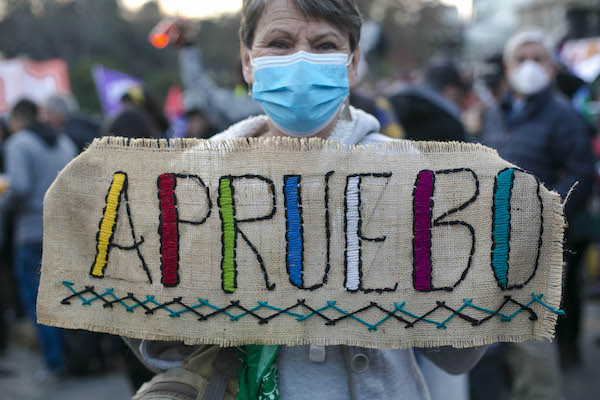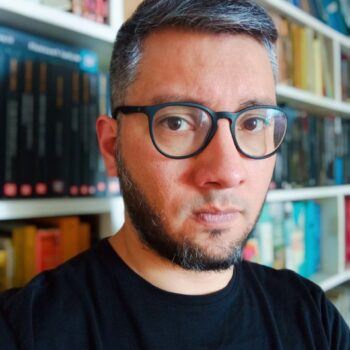Because of its origins in the 2019 protests, the Chilean Constitutional Convention saw activists elected as convention delegates alongside career politicians and political outsiders. Elisa Giustinianovich, who comes from the student, feminist, and environmental movements, was one of these activists. She was elected to the Convention as a representative for District 28, the southernmost district of Chile. She is part of Movimientos Sociales Constituyentes (“Constituent Social Movements”), an alliance of community, labor, environmental, feminist and indigenous organizations formed after the 2019 uprising with the goal of “ending all forms of subjugation, devastation and exploitation that sustain the capitalist system and the neoliberal model.” In this interview, Elisa talks about her experience at the convention and what is next for social movements in Chile. The interview, which has been edited and condensed, took place before the September 4 plebiscite.
You played an important role in some of the most crucial moments of the constitutional process. At the beginning of the process, you were elected as one of the vice presidents. During the closing process, you were chosen to serve on the Committee of Provisional Rules. How did a feminist, anti-racist, and anti-capitalist activist come to take on such enormous tasks?
I believe the Movimientos Sociales Constituyentes collective — to which I belong — played a very important role within the convention. And my impression is that it has a lot to do with the experiences we have due to being members of grassroots organizations. We’ve had many years of assemblies, lobbying, meetings, moderating and listening, managing dissent, and building consensus to maintain a horizontal ethos. This has been especially true in feminist spaces where this exercise of reviewing our practices is continually carried out, including managing a diversity of viewpoints, experiences, and perspectives.
That’s why I feel that our experience was very, very valuable within a space as tense as the Convention, where there was an urgency to reach big agreements and broad consensus in a very short time. So, the people who had experience moderating, directing, facilitating spaces of dialogue, and reaching agreement were well equipped to maintain an environment of respect. Those skills are what helped our collective obtain many important roles within the Convention. I mean, you mentioned, of course, that I was Vice President and also on the Committee of Provisional Rules, but my collective also held the Presidency of the Convention, and we also had several coordinators.
“Lista del Pueblo” (the People’s List) was a group of left-wing candidates not belonging to political parties, who came together as a slate in the Constituent Convention elections in 2021. They obtained almost a million votes (16%) and won 26 seats out of 155, becoming the third largest political force in the country. The group eventually fell apart over an internal debate about whether the social movements represented in the Convention should participate in the presidential and congressional elections. Some wanted to pursue this strategy to gain at least partial access to the administration while others (such as the Feminist Collective) insisted on concentrating all their efforts on the future constitution. These political differences caused elected delegates to leave Lista del Pueblo en masse. Within a year, the group was left without any representation in the Convention. You were one of the first people who criticized Lista del Pueblo’s decision. Why?
I was invited to the meetings of Lista del Pueblo once I was elected because the organization I belong to, the Feminist Collective, had been working in coordination with Movimientos Sociales for over a year at the national level and they were connected to Lista del Pueblo. We had organized programmatic discussions, meetings, and such. A few weeks before the elections, Lista del Pueblo offered us visibility on their digital platforms.
Once I was elected, I attended assemblies and meetings with constitutional delegates from Lista del Pueblo. Overall, I think engaging with them was a very positive experience. Their project helped shape the nature of the Convention and undoubtedly helped facilitate substantial progress on issues of social and environmental rights, among other things. I mean, the fact that we had a majority of left-wingers or progressives or people who listened to popular mandates was definitely an advantage in shaping the Convention. I also think it was positive to be in organizations who were not beholden to parties because that gave us a certain amount of autonomy.
The clash between the different political perspectives on the presidential elections was interesting, but not necessarily surprising. Their candidates didn’t necessarily have previous political experience in grassroots organizations. And that lack of experience also meant that their meeting spaces were quite chaotic or not very inclusive. In my opinion, they were ignoring key steps in terms of having a fruitful discussion on participation in the November elections. And it was such an important discussion to be had. So many of us came from organized spaces outside of political parties; the idea of debating an electoral strategy was a unique and new experience. Participating in the electoral process for delegates to the constituent convention was our first time running candidates in an election, and we only did it because we found the convention to be an avenue to carry out profound structural transformations. Historically, we have found the electoral system to be an instrument that has been a stumbling block for the transformations that we’ve been demanding and fighting for. So, for the Movimientos Sociales group, we knew that we needed to dedicate all our energies to the project of the Constitutional Convention and not the presidential election. Because we had a strong analysis of the different powerful forces that we were going up against in order to create a transformative new constitution. And that’s why the majority of territorial assemblies that arose alongside the constitutional process chose not to mobilize and organize around the presidential election. It’s not that we didn’t see it as important; we understood that the newly formed Congress would be the Congress that was going to have to assume the task of implementing the new constitution. So, it was undoubtedly very relevant. But the idea of having to sustain an ongoing constitutional process and also sustain an electoral process parallel to the constitutional process was simply too exhausting for our grassroots spaces.
What do you think about that role post Constitutional Convention?
I want our organizations to continue participating in the relevant debates and discussions. We need to strengthen our organizations for the coming battles. We have to both act in our communities and at the national level. We need to occupy decision-making spaces because if we don’t occupy them, others will.
In your last words as a conventionalist, you said that the historic challenge consisted of “facing life in an insubordinate (desapatronado) manner.” Could you elaborate on this powerful statement and its implications?
It’s just that I feel that our culture is strongly marked by unequal power structures, structures that come from a patriarchal culture that has dragged on for centuries. It is a mistake to think that all of our problems originate with the dictatorship or the constitution produced by the dictatorship. Our issues have been going on for much longer. Our culture is strongly marked by the entire colonial process that occurred during the period of the conquistadors. As a society, we have learned to look down on others, to discriminate based on class, race, disabilities, bodies, and gender. We debate these issues continuously within feminist spaces. And that’s why we feel that cultural transformation is one of the main battles that has to take place in Chile. And that’s done on the streets, it’s done on a day-to-day basis, and it’s promoted and strengthened through our organizations. As feminists, our struggle is also anti-patriarchal because these power structures are present in our personal relationships. And so “living insubordinately” means transforming those legal instruments that concentrate power relations. And, in that sense, I feel that the new constitution would serve us well. Autonomy is a key concept in the text — both the autonomy that is granted to the regions but also personal autonomy, which recognizes the groups that have historically been abused or discriminated against. I’m thinking of women, children, the elderly, people with disabilities, and also political communities.
Appreciating your kindness and your time in the midst of the campaign for the approval of the new constitutional text. Any closing words for the readers of The Forge?
I hope US readers will take the drafted constitution to heart. It’s a text that arose from a tremendously democratic process, and it’s a text that’s also very representative of the diversity of Chile. It’s a text for the future; it’s a text for the 21st century. We hoped it would respond to many problems that affect us not only in Chile but also internationally. It is an ecological text that rises to the challenges of the climate crisis and the water crisis. It also embraces important concepts such as parity and plurinationality. So I invite you to get to know it, to learn from it, and hopefully to also promote similar processes in your respective places, wherever you are.

